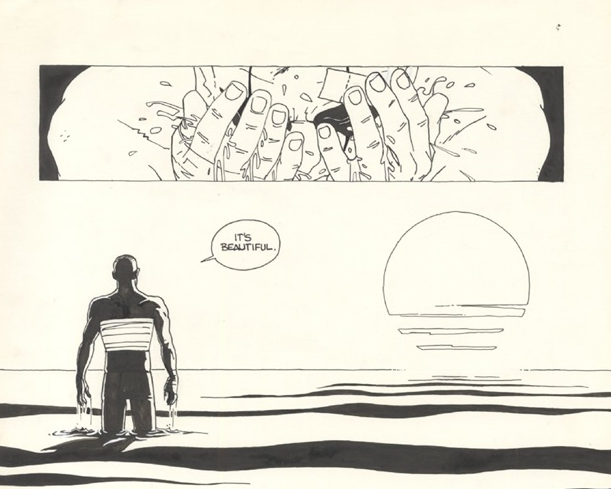 Written by You Higuri
Written by You HiguriIllustrated by You Higuri
Go! Comi
The repercussions of the last volume's actions play out here over these two trades, as Cesare starts to realize he's losing his battle against the demons inside him, no matter how hard he tries. His only salvation is Chiaro, who is saddled with responsibility for at least one death and cannot help him.
When Chiaro tries to hide, he ends up in the arms of another Borgia--Cesare's beloved sister! They cannot control their feelings for one another, adding one more wall between Cesare and the only man who can help him.
After the Pope's manipulations are forced to go through the son he tried to kill all those years ago, Cesare and Chiaro are set on opposing paths, with Lucrezia in the middle. What will Cesare do when the object of his salvation is also in the way of his path to power?
I'm glad I had both of these volumes handy when I was reading, because they basically form a mini-arc within the larger story. One the one hand we have Chiaro and Lucrezia, two lovers who face all sorts of obstacles and taboos on their relationship, yet they press on despite the danger to both of them. I really like the way that Higuri moved this storyline along, mixing it in with the bigger picture but allowing us to see the human cost of the Borgia manipulations.
I also like the fact that Lucrezia, while trapped to a certain extent by her gender, is not afraid to take as much control of her life as she can. After all, she *is* a Borgia--why should she be any less strong willed than her brother or father? Higuri skillfully uses the historical background to both show Lucrezia's plight and also her desire to be free.
At the other end of the spectrum is Cesare, a man quite literally at war with himself. The visual representation of his damnation is pretty cool even if it is quite restrained. We can see that he is falling apart, with only Volpe to help him--and Volpe has an agenda of his own. When Cesare moves to take drastic action to save himself, it grabs the reader's attention.
 Similarly, Volpe's desire to let Cesare's demons run free so he can be close to that power is a great touch, given that Chiaro is not there for counterbalance. It's as though Cesare had an angel and a demon sitting on his shoulder, and now only the demon remains. (If I were the artistic type, I might try to draw a fan piece that showed the three in that way!) Given that Cesare already has evil in his heart, I can't see Volpe doing anything to keep Cesare in control.
Similarly, Volpe's desire to let Cesare's demons run free so he can be close to that power is a great touch, given that Chiaro is not there for counterbalance. It's as though Cesare had an angel and a demon sitting on his shoulder, and now only the demon remains. (If I were the artistic type, I might try to draw a fan piece that showed the three in that way!) Given that Cesare already has evil in his heart, I can't see Volpe doing anything to keep Cesare in control.I'll be curious to see how that plays out, as we watch Cesare lose his humanity, bit by bit. Theoretically he may still be in control, but I think it's clear that Higuri wants us to see Cesare as a man fighting a losing battle against forces no person, no matter how strong, could long resist. The demons are a cancer, and by this time, cutting them out probably wouldn't even work.
For a few volumes now, we've known that Cesare considers Chiaro his "angel" and the only one who can comfort him. After these two volumes, it's clear that Higuri is stripping that away from him to increase his pain. What Cesare will do now that Chiaro is almost certainly lost to him should make the next few trades extremely interesting. The question for the reader is--did random chance cause the separation or are the demons working behind the scenes to undermine Cesare's control? I'm not sure, honestly, but it's definitely something to think about.
While I would have been happy with just the focus on Cesare, Chiaro, and Lucrezia, I do appreciate that Higuri does not ignore the rest of the cast. In fact, as these two volumes progress, it becomes clear to the others that the balance of power is shifting in the Borgia clan, and there's nothing they can do about it. It's a powerful moment in the series when the Pope, Cesare's father, realizes that he's being duped by the same forces that gave him the papacy. The head of the Borgia clan must now pin his dreams on the same child he condemned to die. It's a great twist that's been building for some time now, and I think Higuri handled it perfectly.
Though I liked these two volumes quite a bit and enjoy the series as a whole, there are a few things that seemed a bit out of place. A historical figure is revealed to have been with us all the time, and I'm not sure I like the intrusion. (Your mileage may vary.) It's going to be awkward seeing him appear in the future because now I can only think of his legacy as a real person. I know that this is a manga with a historical setting, but I feel like the inclusion was gratuitous.
I also was a bit confused by the fact that there were apparently sex scenes off-camera without at least a visual hint to the reader, and Cesare's apparent bi-sexuality is something that seems to be thrown in rather awkwardly. These latter problems might have to do with adaptation and translation more than Higuri's original. A few times, the way the characters spoke felt off to me. I don't know if it was just a few difficult passages or if I am growing more sensitive to the translator's ear. Either way, these issues do take something away from the books, though not enough to stop me from liking them.
In general, this was a pretty good set of volumes in this ongoing series. I really like the way thay Higuri is using the seeds she sowed in the prior volumes to create new tensions and keep the plot moving. There's a much better marriage of the demonic, political, and romantic as well. I think she hits the balance just about right, making me look forward to reading the final three volumes available in English. I definitely like Cantarella, and those looking for historical manga definitely need to check this one out from the beginning.







